The PR Agency Model is Broken
Nov 10, 2016 Beth Monaghan
Barring a legal move to delay the law, on Dec. 1, 2016, PR agencies – and all types of companies across the nation – will get a wake-up call. The U.S. Department of Labor has updated overtime regulations to reflect the original intent of the Fair Labor Standards Act. After that date, the salary threshold for overtime will be raised to $47,476 per year, which will affect 4.2 million workers. This is the same act that, back in 1938, was responsible for the 40-hour work week.
I applaud the new law. It’s one that values time and humanity, and one that may bring about the kind of culture that values great work over grueling hours, which by the way, creates better business results. This is especially important for industries like PR that rely on creativity to fuel those results.It’s time for a shift in PR anyway. We’ve earned ourselves a bad reputation. The U.S. Bureau of Labor and Statistics (BLS) describes the work conditions in PR this way: “Long workdays are common, as is overtime.” Our profession always ends up on lists of the top 10 most stressful jobs and is also known for employee churn rates as high as 20 to 25%.
Somewhere amid the proliferation of mobile phones, social media and 24-hour news reporting, we sacrificed the tenets of creativity to the demands of availability. And we learned from the “best.” PR agencies have grown up in the shadow of the workaholic “Mad Men” of advertising. I’ll hand that era one thing: It prized the big idea – and the space (or the drinks) – required to get there.
Today, those dreamy days of big thinking are gone and the days of emojis, Snapchat ephemerality, and breathless texts are here. Oh, and “Mad Men” are not the typical PR agency workers. The typical PR worker is female – 70% of us – and she’s probably going to have kids. The BLS reports that 71% of mothers work and 40% of women with children are the sole or primary breadwinners.
This sounds like an opportunity to me: If PR can’t make the case for how women can become equal and successful in the workplace, which industry can? Of course, working in PR is not for slackers. It’s for the most ambitious and hard-working. It’s a career that requires you to be available at a moment’s notice. However, we’re confusing availability with working around the clock. Do we value hours or ideas? Hard work or great work? Being available at the right time is about using good judgment and being committed to our jobs. Working around the clock is about burning out.
Back in 1926, Henry Ford’s son, Edsel, then president of the company, limited his workers’ weeks to 40 hours and closed his factories on Saturdays to increase productivity by making employees’ lives better. He said, “Every man needs more than one day a week for rest and recreation…The Ford Company always has sought to promote [an] ideal home life for its employees. We believe that in order to live properly every man should have more time to spend with his family.”
PR is not a factory line. It’s a creativity flow that also requires resourcefulness and connections, all three of which require a huge amount of judgment on the part of the employee. If we’re going ask employees for ideas that could shape markets, why on earth are we asking them to operate in environments that sap their souls?
At InkHouse, we’ve made abstract concepts concrete through policies that fuel creativity in the workplace and help us live better lives. To help us disconnect from the frenetic day-to-day pace, we offer unlimited vacation time, work-from-home Fridays to focus on writing projects, and banned email outside the hours of 7 a.m. and 7 p.m. (barring any emergencies). To help ideas flow, we encourage walking meetings in lieu of sit-down coffees, host an internal speaker’s series in which employees tell their own stories, bring in guest speakers that can teach us something new, and hold in-office yoga to make us literally flow. The end result is a much happier, healthier workforce that supports balance, challenges the norm and takes risks – the good kind.
We need more good ideas, not more emails. We need more of what author Brenda Ueland called “slow, big ideas” in her book If You Want to Write back in the 1930s. She said, “The imagination needs moodling – long, inefficient, happy idling, dawdling and puttering. These people who are always briskly doing something and as busy as waltzing mice, they have little, sharp staccato ideas…but they have no slow, big ideas.” Let’s get to moodling.
Originally appeared in Forbes.

.png)




